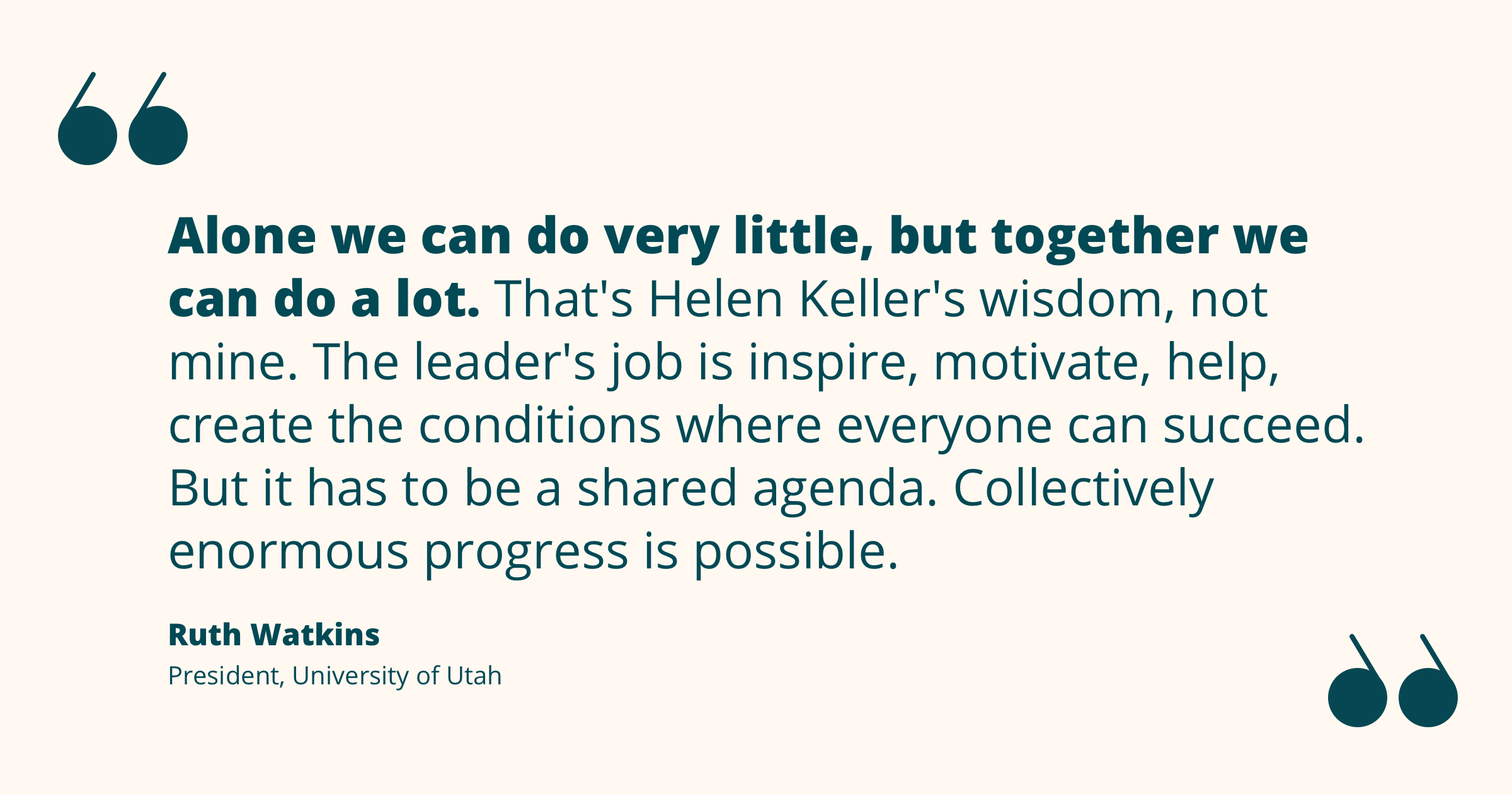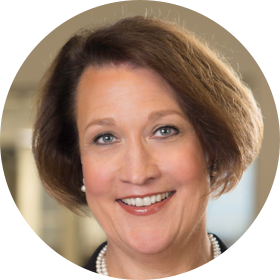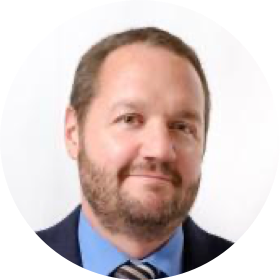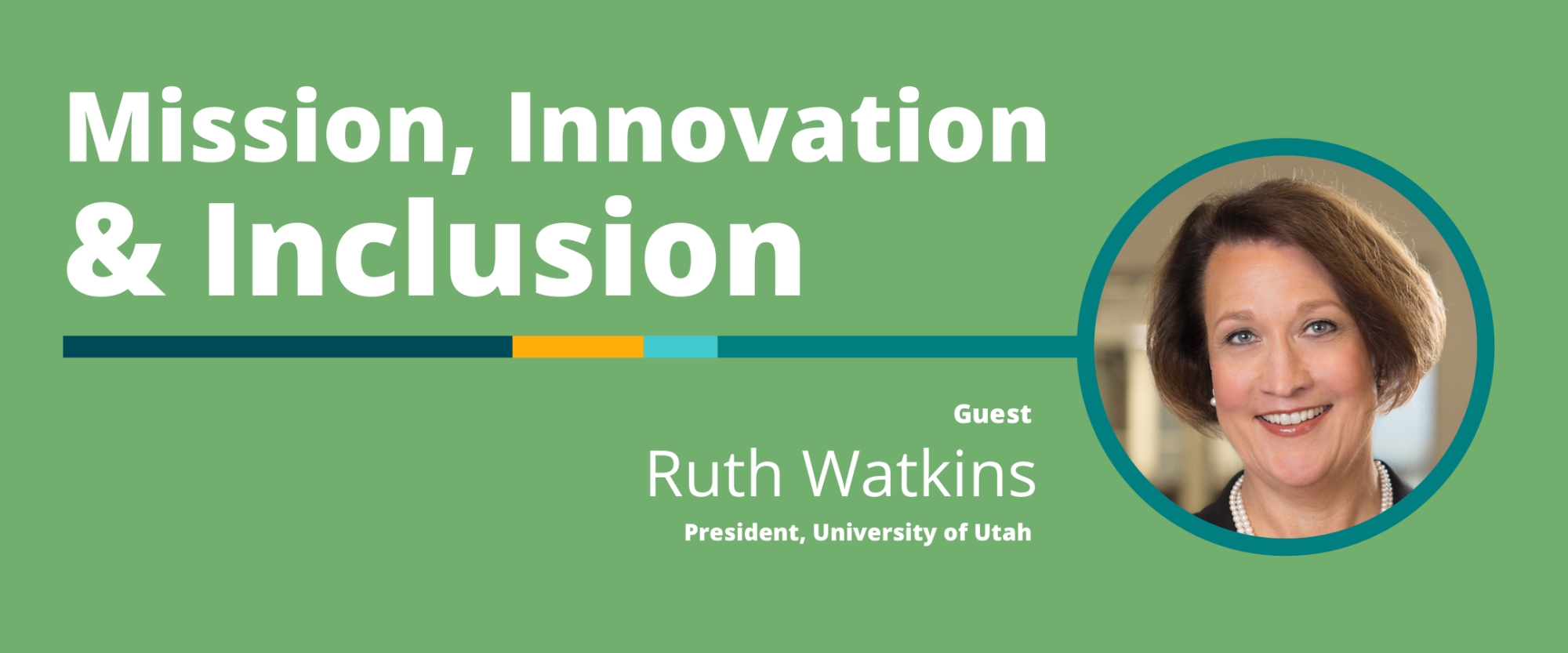Note: This interview, Episode 8 of the Weekly Wisdom Series, originally aired on June 8, 2020 as part of the University Innovation Alliance’s Innovating Together podcast, appearing live on Facebook, Twitter, and LinkedIn.
I'm excited to bring you another discussion from our Innovating Together Podcast, a live conversation created through a partnership of the University Innovation Alliance (UIA) and Inside Higher Ed. I'm UIA's Executive Director, and my co-host for this broadcast was Paul Fain, Inside Higher Ed's Contributing Editor. In Episode 8 of Innovating Together's Weekly Wisdom series, we interviewed Dr. Ruth Watkins, President of the University of Utah. The conversation was full of positive energy as President Watkins spoke about staying the course on her university's mission of service and research, while putting equal emphasis on addressing the needs and comfort level of faculty, staff, and students during the COVID-19 pandemic. We found her wisdom about moving forward together to be particularly inspiring, as well as her commitment to using higher education as a platform for social justice.
The Mission Matters
Between facing the pandemic's ongoing demands and the pressing issues of equity and justice raised by the national conversation around the recent death of George Floyd, keeping long-term focus is surely challenging for a university leader like President Watkins. We asked her how she stays focused.
"One thing that we've learned through this pandemic," she said, "is that the trust and respect that Americans now have for their research universities has really grown through the pandemic. That helps me to focus because it reminds me how much the mission matters. The mission matters in terms of delivering research that will help people in America and the world. The mission matters in terms of our capacity to help the people who come to us finish the degrees that they came for, and not to leave before that. And the mission matters a great deal right now as we think about how we put Americans back to work. I think whenever you get caught up in an urgent situation of the moment, it does help to step back and remember the mission. Why are we doing the work we do, and who's counting on us to deliver it? Our communities, our stakeholders, our people, and that's the research we do, the education we provide, the way we engage with and uplift communities, and certainly right now the healthcare that an academic medical center provides to stakeholders from the state and the region."
Lessons, Opportunities, and Innovations
A frequent topic in our conversations with higher ed leaders is about how the pandemic has forced change on their institution. We asked President Watkins if she'd like to adopt any of those changes going forward.
"The current situation in the world has helped us all build an awareness of the enormous crisis of inequality," she observed. "And that is vital, that we use this moment and build on it and recognize systemic inequalities, processes, and policies in our institutions that have perpetuated inequality and racism, I think unintentionally, but it doesn't matter. The pandemic has laid bare for us health disparities, unequal access to health care. This is a moment where we can act differently, where we can change as institutions. We will lead society when we do that. I see around me an incredible spirit of kindness, of outreach to others, certainly the outpouring of our donor community towards our student emergency fund and towards research in health disparities around COVID-19. I hope that stays with us."
President Watkins believes that the University of Utah, an institution with a focus on healthcare research, is advantageously positioned to "innovate and be creative and move ahead assertively," she told us. "And I think that opportunity to better serve people is all around us. Many academic medical centers, making fairly slow progress in working towards telehealth delivery. The pandemic accelerated that massively. I think it would have taken us a decade to make the kind of progress we have in telehealth in a matter of weeks. So that is, I think, pretty important for us to be asking those questions, and as we think about how we want to go forward. We don't want to return to the way we were. We want to return to better."
Shifting from the systemic to the personal, she added, "The pace has slowed in terms of evenings and weekends. And I think the gift of time to spend with each other, however we've been, right now it's families and small groups; but I hope that we learn something about our place and about using our time for the collective good. I think that may be a lesson we could take from the pandemic."
Leading by Inclusion
President Watkins admitted that leading a university is a tremendous challenge during a year of profound change. "In this moment," she told us, "both in terms of the pandemic and in terms of our clear focus on the enormous price of inequality and systemic inequity and racism, I think we have the opportunity to be part of leading in higher education, a place that really can transform lives, support health and well being, and openly address white privilege and take action to change racism."
She feels privileged to lead through sharing her overall optimism. "We need participation," she stated. "People will support what they help create. And people will enact what they believe in and help create. I think also communication is always important for a university leader, and acknowledging the fact that there is quite a bit of anxiety around uncertainty. So as we face this challenge, staying open to that, letting people know this is dynamic and changing, giving them sources of information, and involving as many people as you can in planning, all those are strategies that really help."
When we asked President Watkins about her leadership philosophy, she said, "Alone we can do very little, but together we can do a lot. And that's Helen Keller's wisdom, not mine. The leader's job is inspire, motivate, help, create the conditions where everyone can succeed. But it has to be a shared agenda. Collectively enormous progress is possible. And I have found such a collaborative spirit and a collective that really wanted to move the University of Utah forward. We've been able to do a lot in terms of the success of our students, the impact of our research, and our role, what I like to say is not just the University of Utah but the University for Utah. Much has happened here because of that spirit of the collective impact and importance of the university."

Managing the Risks
While planning on an institutional scale is critical, President Watkins is sensitive to the balance between the university's mission and the concerns of faculty, staff, and students.
"Many of us believe that what happens on a college campus face to face in a research university has enormous power, that connecting and engaging outside and beyond the classroom is powerful as well," she said. "Of course, we don't really know how long the pandemic is going to last. So we are charting a path of managing risk as successfully and well as we can. And of course, on the specific question of students or faculty or staff who may have health conditions that make them more vulnerable, we are working hard to provide temporary modifications in how things are delivered and in how we work. And there may be students who for whatever reason feel that staying online and being able to access the university that way, as we have made possible, is the best option for them. So we're trying to create this more dynamic, fluid environment that allows some adaptations that meet both needs as well as they can, while continuing to deliver on the important mission that society asks of us and what they depend on."
Wisdom From the Natural World
When we asked President Watkins if she had time for personal enrichment during this difficult period, she told us, "Well, I am an avid reader. A lot about higher education, but I think sometimes you need to draw lessons for higher education from other places. So I'm reading Richard Powers' The Overstory, which is just a phenomenal book, a vast book with a lot of wisdom and a lot of lessons. Some of them are painful and difficult, and some of them are hopeful. It's also just beautiful writing. So I think having the capacity to think about big issues in the natural world and the interconnectedness of humans and the environment, and just a powerfully written novel, it's good for everybody, too."
And maybe this is the kind of patience and wisdom we all need in comprehending and coping with the COVID-19 pandemic.
Links Mentioned in This Episode
• University of Utah
• Death of George Floyd (as reported in Time magazine)
• Unequal access to health care (in the U.S.)
• Student emergency fund (via U. of U. Office of Scholarships and Financial Aid)
• Telehealth (U. of U. Telehealth)
• The Overstory by Richard Powers
Bios of Guest and Co-Hosts

Guest: Ruth Watkins, President, University of Utah
Dr. Ruth V. Watkins, who became the University of Utah's 16th President in 2018, is the first woman to serve in that office. President Watkins’ signature initiatives include degree completion, innovative student funding models, strong partnerships with community stakeholders, uniting the campus as One U to drive innovation in research, education, and operational efficiency, and addressing grand societal challenges such as mental health and interpersonal violence. Prior to assuming office, she spent almost five years as U. of U.'s Provost and Senior Vice President for Academic Affairs, while also serving as a full professor in the Department of Linguistics. Dr. Watkins was previously the Dean at the University of Illinois at Urbana-Champagne - Applied Research Institute. She began her academic career in 1989 as an assistant professor at the University of Texas at Dallas, as well as Program Director of the Callier Center for Communication Disorders. She earned her master's and Ph.D. degrees in speech-language pathology at the University of Kansas, and her bachelor's at University of Northern Iowa. In 2003, Dr. Watkins was named a fellow of the American Speech-Language-Hearing Association.
Note: On January 12, 2021, Dr. Watkins announced that she has accepted a position as president of Strada Impact, and will be stepping down from her leadership position at the University of Utah in April.

Co-Host: Bridget Burns, Executive Director, University Innovation Alliance
Dr. Bridget Burns is the founding Executive Director of the University Innovation Alliance (UIA). For the past decade, she has advised university presidents, system chancellors, and state and federal policy leaders on strategies to expand access to higher education, address costs, and promote completion for students of all backgrounds. The UIA was developed during Bridget’s tenure as an American Council on Education (ACE) Fellowship at Arizona State University. She held multiple roles within the Oregon University System, including serving as Chief of Staff and Senior Policy Advisor, where she won the national award for innovation in higher education government relations. She was a National Associate for the National Center for Public Policy and Higher Education, and has served on several statewide governing boards including ones governing higher education institutions, financial aid policy, and policy areas impacting children and families.

Co-Host: Paul Fain, Contributing Editor, Inside Higher Ed
Paul Fain joined Inside Higher Ed in September 2011 after six years covering leadership and finance for The Chronicle of Higher Education. He has also worked in higher ed P.R., with Widmeyer Communications, but couldn't stay away from reporting. A former staff writer for C-VILLE Weekly in Charlottesville, Virginia, he has written for The New York Times, Washington City Paper, and Mother Jones. His journalism awards include one for beat reporting from the Education Writers Association and the Dick Schaap Excellence in Sports Journalism Award. Paul got hooked on journalism while working at The Review, the student newspaper at the University of Delaware, where he earned a degree in political science in 1996. A native of Dayton, Ohio, and a long-suffering fan of the Cincinnati Bengals, he plays guitar in a band with more possible names than polished songs.
About Weekly Wisdom
Weekly Wisdom is an event series that happens live on Facebook, Twitter, and LinkedIn. It also becomes a podcast episode. Every week, we join forces with Inside Higher Ed and talk with a sitting college president or chancellor about how they're specifically navigating the challenges of this moment. These conversations will be filled with practicable things you can do right now by unpacking how and why college leaders are making decisions within higher education. Hopefully, these episodes will also leave you with a sense of optimism and a bit of inspiration.
Rate, Review & Subscribe
Learn why hundreds of people have rated this new podcast 5 stars! Please join others and rate and review this podcast. This helps us reach and inform more people -- like you -- to help increase the number and diversity of college graduates in the United States.
Click here, scroll to the bottom, tap to rate with five stars, and select “Write a Review.” Then be sure to let us know what you loved most about the episode! Also, if you haven’t done so already, subscribe to the podcast. We’ll be adding a bunch of bonus episodes to the feed and, if you’re not subscribed, there’s a good chance you’ll miss out.

